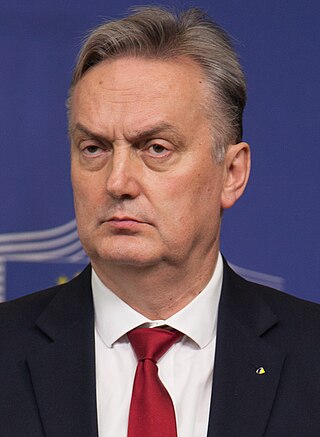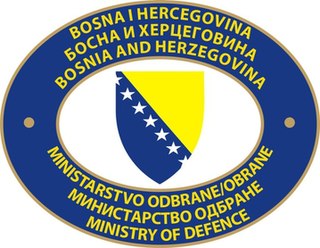The politics of Bosnia and Herzegovina are defined by a parliamentary, representative democratic framework, where the Chairman of the Council of Ministers of Bosnia and Herzegovina, named by the Presidency of Bosnia and Herzegovina, is the head of government. Executive power is exercised by the Council of Ministers of Bosnia and Herzegovina and the Presidency of Bosnia and Herzegovina. Legislative power is vested in both the Council of Ministers and the Parliamentary Assembly of Bosnia and Herzegovina. Members of the Parliamentary Assembly are chosen according to a proportional representation system. The judiciary is independent of the executive and the legislature.

The Federation of Bosnia and Herzegovina is one of the two entities composing Bosnia and Herzegovina, the other being Republika Srpska. The Federation of Bosnia and Herzegovina consists of ten autonomous cantons with their own governments and legislatures.

Dragan Čović is a Bosnian Croat politician who served as the 4th Croat member of the Presidency of Bosnia and Herzegovina from 2002 to 2005 and from 2014 to 2018. He is the current president of the Croatian Democratic Union and has been serving as a member of the national House of Peoples since 2019, having previously served from 2011 to 2014.

The Social Democratic Party of Bosnia and Herzegovina, also simply known as the Social Democratic Party is a social-democratic political party in Bosnia and Herzegovina.

Zlatko Lagumdžija is a Bosnian diplomat and politician serving as Permanent Representative of Bosnia and Herzegovina to the United Nations since July 2023. He previously served as Minister of Foreign Affairs from 2001 to 2002 and from 2012 to 2015. Lagumdžija was also Chairman of the Council of Ministers of Bosnia and Herzegovina from 2001 to 2002. He was president of the Social Democratic Party from 1997 to 2014.

The Croatian Party of Rights of Bosnia and Herzegovina is an extra-parliamentary party in Bosnia and Herzegovina. The party was established in 2004 as a splinter of the Croatian Party of Rights established in 1991, under the name Croatian Party of Rights Đapić-dr. Jurišić, named after its founders Anto Đapić and Zvonko Jurišić. In 2010, the main party dissolved, while the Croatian Party of Rights Đapić-dr. Jurišić usurped their name.

Milorad Dodik is a Bosnian Serb politician currently serving as the 8th president of Republika Srpska since 2022, a position he previously held from 2010 to 2018. He also served as the 7th Serb member of the Presidency of Bosnia and Herzegovina from 2018 to 2022.

Haris Silajdžić is a Bosnian politician and academic who served as the 5th Bosniak member of the Presidency of Bosnia and Herzegovina from 2006 to 2010. He was the Prime Minister of the Republic of Bosnia and Herzegovina from 1993 to 1996.

Željko Komšić is a Bosnian Croat politician serving as the 6th and current Croat member of the Presidency of Bosnia and Herzegovina since 2018. Previously, he was a member of the national House of Representatives from 2014 to 2018.

Krešimir Zubak is a Bosnian Croat politician who served as the 1st Croat member of the Presidency of Bosnia and Herzegovina from 1996 to 1998. At the beginning of the Bosnian War in 1992, he joined the Croatian Democratic Union.

The Ministry of Defence of Bosnia and Herzegovina is the governmental department in charge of the Armed Forces of Bosnia and Herzegovina and protection of Bosnia and Herzegovina from invasion and threats.

General elections were held in Bosnia and Herzegovina on 3 October 2010. They decided the makeup of Bosnia and Herzegovina's Presidency as well as national, entity, and cantonal governments.

Živko Budimir is a Bosnian Croat politician who served as the 9th President of the Federation of Bosnia and Herzegovina, one of the two autonomous entities that compose Bosnia and Herzegovina, from 17 March 2011 until 9 February 2015. He is the founder and current president of the Party of Justice and Trust.
Parliamentary elections were held in Bosnia and Herzegovina on 11 November 2000. Voter turnout was 64%.

General elections were held in Bosnia and Herzegovina on 12 October 2014. They decided the makeup of Bosnia and Herzegovina's Presidency as well as national, entity, and cantonal governments. Voter turnout was 54.47%.
Several referendums have been held in Republika Srpska during its existence, whilst others have been proposed but not happened.
The Croat federal unit, Croat entity, or third entity, is a proposed federative unit in Bosnia and Herzegovina encompassing areas populated by Croats, to be created by the partition of the Federation of Bosnia and Herzegovina into Croat and Bosniak entities. The proposal is supported by the Croatian National Assembly, which includes the electoral representatives of Bosnian Croats. However, a detailed plan for its partition, including its borders, has yet to be finalized.

General elections were held in Bosnia and Herzegovina on 7 October 2018. They decided the makeup of the presidency as well as national, entity and cantonal governments. Voter turnout was 54%.

The Ministry of Finance and Treasury of Bosnia and Herzegovina is the governmental department which oversees the public finances of Bosnia and Herzegovina.

General elections were held in Bosnia and Herzegovina on 2 October 2022. They decided the makeup of the presidency as well as national, entity and cantonal governments.



















